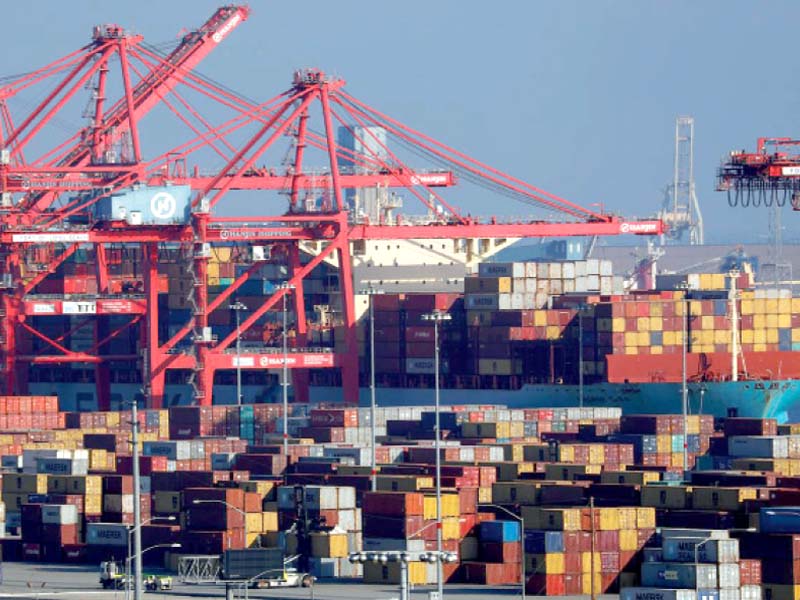
Cabinet members have raised question over the performance of export-oriented sectors in terms of exports to the international market as there was no data available to verify benefits to the economy.
The cabinet, in a recent meeting, took up the matter of registration of new units for getting incentives on account of electricity and liquefied natural gas (LNG) supply at discounted rates to the export-oriented sectors.
During discussion, some members expressed the view that the export-oriented sectors (erstwhile zero-rated sectors) had been receiving incentives for decades without any data to confirm the benefits these sectors had brought to the economy.
The adviser to PM on commerce responded that it was extremely difficult to assess the performance of those sectors in relation to the concessions they received as there were multiple factors, mainly the exchange rate, which determined the net economic benefit these sectors brought home.
It was also clarified that exports were mainly linked with the exchange rate, whereas the subsidy on utilities had a positive impact on domestic sales.
The adviser to PM on institutional reforms and austerity commented that Pakistan had been following the same export structure since the 1990s. Focus should be shifted towards sunrise (emerging) industries to increase Pakistan’s international market share, which had come down to half in three decades.
Meanwhile, the adviser to PM on finance and revenue assured the forum that some framework would be put in place to address the question. It was
emphasised that in future a wellthought-out merit order would be followed while granting such incentives.
The cabinet considered a summary titled “Ratification of decisions taken by the Economic Coordination Committee (ECC) of the cabinet in its meeting held on 2.12.2020” dated December 4, 2020, submitted by the Cabinet Division, and ratified the decision taken by the ECC.
Earlier, the Ministry of Commerce submitted proposals for a concessionary regime for electricity, regasified LNG and local gas supply to the major export-oriented sectors for consideration of the ECC.
It suggested that the previous list of manufacturers or exporters declared zero-rated by the Federal Board of Revenue (FBR) under condition (xii) of SRO 1125 may be adopted in the case of export-oriented sectors.
It proposed that the FBR may register new manufacturers or exporters of five major export-oriented sectors under the Commerce Division OM dated December 13, 2019 in a manner specified by the FBR.
It also proposed that the FBR, Petroleum and Power Divisions may formulate a periodic rechecking/ monitoring/ withdrawal strategy for previous and newly registered units along with a procedure to penalise in case of misrepresentation and misuse of the scheme.
Special Assistant to PM on Petroleum Nadeem Babar raised concern in the Ministry of Commerce’s summary.
He said that the provision of gas to the industrial sector had become quite difficult due to its severe shortage in the country.
He also said that the Petroleum Division and Sui Northern Gas Pipelines Limited (SNGPL) did not have the expertise or direct access to identify/ analyse business information that accounted for industrial consumers as it was primarily related to the FBR and Ministry of Commerce.
Therefore, the SAPM on petroleum was of the opinion that the preparation of a regular/ routine/ random/ rechecking/ monitoring/ withdrawal strategy could be dealt with by the FBR and Ministry of Commerce.
The FBR raised concern over the proposal and stated that it did not have the mechanism for the said purpose after abolition of SRO 1125. The SAPM on revenue also supported the FBR’s views.
However, the adviser to PM on institutional reforms observed that the concessionary utility rates regime available to the export-oriented sectors should also be extended to new prospective
investors in related fields in order to encourage them to bring investment to the country and create job opportunities.
The Ministry of Commerce had submitted a summary to the ECC in October 2020 for approval.
The minister for energy and commerce adviser requested the forum to deliberate on the concessionary regime for electricity, RLNG and local gas for the export oriented sectors.
The Ministry of Commerce was of the view that the ECC’s decision was in contradiction with the spirit of earlier decisions on the concessionary regime, which was aimed at reducing input cost.
The government offered concessionary utility rates to the manufacturers or exporters of zero-rated sectors registered with the FBR under STGO-117 and there had been no distinction between the manufacturers and actual exporters.
The commerce adviser opposed the move and argued that the units (exporters), which were carrying out outsourcing work, would not be able to differentiate the purchase orders they had to process or complete for actual exporters or local suppliers.
Secondly, the utility consumption was negligible for the actual exporters, ie commercial exporters and standalone stitching units, as prices of their inputs ie yarn, fabric and processed fabric would not be reduced.
Finally, the upstream industry may initiate export of raw/ semiprocessed inputs to take advantage of concessionary rates.
The Ministry of Commerce said that yarn and processed fabric segments of the textile sector could not be segregated as actual exporters and local suppliers.
It was added that the only beneficiaries would be the Chinese and Bangladeshis, who would be purchasing Pakistan’s yarn and processed fabric or the big domestic composite units.
The Revenue Division was of the view that support may be provided through the Drawback of Local Taxes scheme directly to the exporters and importantly zero-rating of electricity and gas was their internal arrangement and they would be liable to reestablish paraphernalia to initiate the registration again.
Therefore, the FBR proposed that status quo may be maintained for the current financial year and no new units may be registered.
The Finance Division suggested that the status quo may be maintained for the current financial year and proposed that the FBR, Petroleum and Power Divisions may review the previous list of beneficiaries.
The Ministry of Commerce responded that since July 2019, no new unit had been registered under the concessionary regime, resultantly, discouraging investment by new units.
Moreover, the FBR was already registering new units till June 2019 and they can restart the exercise as Power and Petroleum Divisions had refused to register new units under the said regime.


1731914690-0/trump-(26)1731914690-0-165x106.webp)








1731884290-0/image-(9)1731884290-0-270x192.webp)






COMMENTS
Comments are moderated and generally will be posted if they are on-topic and not abusive.
For more information, please see our Comments FAQ